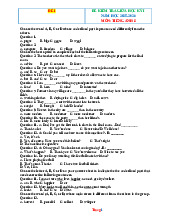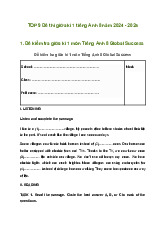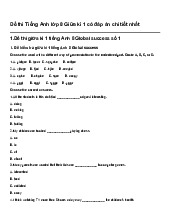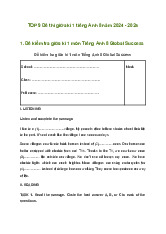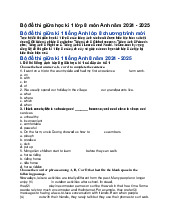








Preview text:
ĐỀ CƯƠNG ÔN TẬP GIỮA KÌ 1 MÔN TIẾNG ANH 8 i-Learn Smart World
A. NGỮ PHÁP ÔN THI GIỮA KÌ 1
1. Động từ (để thể hiện sở thích) + gerund
- Chúng ta có thể sử dụng danh động từ (V-ing) sau một số động từ, chẳng hạn như:
prefer, love, enjoy, like, don't (really) like hoặc hate để diễn đạt sở thích của mình. Ví dụ:
- What does Peter like doing in his free time? - He likes watching TV.
Peter thích làm gì trong thời gian rảnh? - Cậu ấy thích xem TV.
- Do you love reading comics? - I don't like reading comics, but I enjoy reading Conan detective series.
Bạn có thích đọc truyện tranh? - Tôi không thích đọc truyện tranh, nhưng tôi thích đọc truyện trinh thám Conan.
2. Thì Hiện tại đơn cho nghĩa tương lai tiếng Anh
- Chúng ta có thể sử dụng thì Hiện tại đơn để đề cập đến một sự kiện có lịch trình, thời
gian biểu cố định hoặc một sự kiện đã biết trước trong tương lai. Ví dụ:
- Be on time! The movie begins at 7:45 p.m. (a schedule)
Đúng giờ! Bộ phim bắt đầu lúc 7:45 tối. (một lịch trình)
- The last bus leaves at 9:00 p.m. (a timetable)
Chuyến xe buýt cuối cùng khởi hành lúc 9:00 tối. (một thời gian biểu)
- Her birthday is on Saturday next week. (a known future fact)
Sinh nhật của cô ấy là vào thứ bảy tuần tới. (một sự thật đã biết trong tương lai)
3. Giới từ chỉ thời gian tiếng Anh
- Chúng ta có thể dùng giới từ chỉ thời gian để nói về thời điểm chúng ta sẽ làm gì đó.
Chúng ta có thể dùng from. . to. . để nói một việc gì đó kéo dài bao lâu. Ví dụ:
- Ann has Math class from 9 to 10 a.m.
Ann có lớp Toán từ 9 đến 10 giờ sáng.
- Chúng ta có thể sử dụng cho đến khi nói đến thời điểm được đề cập. Ví dụ:
- Tom has soccer club until 6 p.m.
Tom có câu lạc bộ bóng đá cho đến 6 giờ chiều.
4. Phân biệt trạng từ ngắn - trạng từ dài
- Trạng từ ngắn (Short adverbs) là trạng từ có một âm tiết Ví dụ:
- hard, fast, near, far, right, wrong, . .
Trạng từ dài (Long adverbs) là trạng từ có 2 âm tiết trở lên. Ví dụ:
- quickly, interestingly, tiredly, . .
5. So sánh hơn với trạng từ tiếng Anh
- So sánh hơn với trạng từ ngắn:
S1 + Adv- er + than + S2 Pronoun
Ví dụ: They work harder than I do.
- So sánh hơn với trạng từ dài:
S1 + more + adv + than + S2 Pronoun
Ví dụ: My friend did the test more carefully than I did. Trong đó:
S1: Chủ ngữ 1 (Đối tượng được so sánh)
S2: Chủ ngữ 2 (Đối tượng dùng để so sánh với đối tượng 1) Lưu ý:
+ Một số tính từ/ trạng từ biến đổi đặc biệt khi sử dụng so sánh hơn. Good/ well -> better Bad/ badly -> worse Much/ many -> more a little/ little -> less far -> farther/ further
A. MỘT SỐ DẠNG BÀI TẬP ÔN LUYỆN
Câu 1: Match the word(s) in A with the rest in B to make a complete sentence.
A. is to assemble several pieces to 1. make vlogs make a final model
B. either partially or primarily play 2. build models
through the Internet or any other computer network available
C. refers to a type of blog where you 3. read comics
can talk on a particular subject 4. bake cakes D. comprehend the meaning by
looking at stories told in pictures
E. refers to cook a sweet food in the 5. play online games oven with the high temperature
Câu 2: Complete the sentenceswith the correct form of the Present Simple or the Present Continuous
1. Tom usually ______________ (play) football, but today he ______________ (play) basketball.
2. I usually ______________ (watch) TV, but today I ______________ (play) computer games.
3. He usually ______________ (go) jogging on Sundays.
4. Jack always ______________ (do) homework before dinner.
5. Look, Silvia ______________ (cry). Let’s see what’s wrong.
6. Ted ______________ (wash) the car now, but his father usually ______________ (wash) it.
7. Sophie usually ______________ (walk) to school.
Câu 3. Choose the option (A, B, or C) that best completes each of the following sentences.
Question 1.Shopping. . . . . a mall can be great fun. Would you like to join us? A. with B. at C. to
Question 2.As a teenager, John enjoys going. . . . .fun rides in amusement parks. A. on B. to C. for
Question 3.My little sister doesn't like crowds,. . she never goes to the supermarket at weekends. A. because B. therefore C. so
Question 4.Jack thinks that collecting stamps is. . and he prefers activities with his peers. A. amusing B. boring C. fun
Question 5.Teenagers are advised to. . . .some sports in their free time. A. go B. have C. do
Question 6.Jack generally. . . .little TV.
A. watches B. is watching C. to watch
Question 7.The children are all looking forward. . to the circus this weekend A. to go B. going C. to going
Question 8.We. . . . for the coming exam. We can't talk now.
A. revise B. are revising C. have revised
Question 9.Peter enjoys. . .foreign stamps and reading about them.
A. designing B. collecting C. playing
Question 10.Jack is now learning to …………. the piano. A. perform B. sing C. Play
Câu 4: Complete each sentence using a preposition
1. Linh is really __________ jogging. She jogs every afternoon.
2. He’s so fond __________ the Harry Potter books. She has read all of them.
3. Mike is mad __________ pop music. He is always listening to Lady Gaga.
4. Sam is very interested __________ collecting coins. He just loves knowing about their history.
5. I’m so keen __________ snowboarding. I do it every winter.
Câu 5: Choose the correct answer A, B, C or D
What do you like doing best (1) ____________ your spare time? My cousin Paul likes going
(2) ____________ in the country and (3) ____________ photos. Sometimes he (4)
____________ with his friends, and they (5) ____________ at the park or at the beach. They
always (6) ____________ a good time. His brother Chris isn’t (7) ____________ on walking.
He spends most of the (8) ____________ at home. 1. A. for B. when C. in D. at 2. A. for walks B. walks C. a walk D. to walk 3. A. making B. having C. talking D. doing 4. A. travels B. gets up C. sees D. goes out 5. A. enjoy B. Have fun C. hobby D. go 6. A. have B. make C. do D. like 7. A. interested B. out C. decided D. keen 8. A. other B. time C. people D. money
Câu 6: Rewrite the following sentences with the given words and/or beginnings in such a
way that the meanings stay unchanged.
1. Would you like to decorate your room on your own? (WANT)
Do ……………………………………………………………………………. yourself?
2. During dinner, she never watches TV.
While …………………………………………………………………….
3. Jack likes painting portraits. (KEEN)
…………………………………………………………………….
4. Both John and Mary enjoy team sports. (SO)
John enjoys …………………………………………………………………….
5. How about cycling to the country this weekend? (CYCLING)
Let's …………………………………………………………………….
Câu 7. Complete the passage with the comparative form of the adjectives in brackets.
Is life better now than it was in the past? Of course in many ways life is (1)_________
(easy) now. We live in the world which is (2)_________ (clean) and safer. It is generally
(3)_________ (healthy) as well, and because of improvements in medical care, both men and
women can expect to live (4)________ (long) lives. Our day-to-day existence is (5)________
(comfortable), but are we (6)_________ (happy)?
The rhythm of life is faster, and (7)_________ (stressful). People are always in a hurry. In
the end it is hard to say things were (8)_________ (good) or (9)_________ (bad) before. As
the saying goes ‘the grass is always (10)_________ (green) on theother side of the fence’.
Câu 8 Write the correct form or tense of the verbs in brackets. 1. We
___________(play) football this afternoon. Do you want to play too?
2. Could you meet me at the airport tomorrow? My flight___________(arrive) at six.
3. Last summer, my friends and I ___________(spend) our holiday on a farm.
4. Nick ___________(not ride) a buffalo drawn cart before.
5. The cattle ___________(graze) on the green pastures right now.
6. Millions of Mongolians ___________(be) semi-nomadic herders for thousands of years.
7. My family ___________(live) in a small town for ten years before moving to Boston.
8. Country life ___________(not excite) me at all. It’s so boring.
9. Nick would like ___________(visit) the countryside at the harvest time.
10. I don’t mind ___________(drive) for 1.5 hours on the weekend to get out to the countryside.
Câu 9 Write the correct form of the word in brackets.
1. People seem to have lost their ___________ in boating on small rivers. (enjoy)
2. More and more ___________are leaving the countryside to city. (farm)
3. A town has a ___________ population than a village does. (large)
4. Sylvia likes the ___________ atmosphere during her stay in the valley. (peace)
5. The firefighters were praised for their ___________ and devotion to duty. (brave)
6. Visually the house is very pleasing, but it’s ___________. (comfort)
7. It is true that the city can provide much ___________. (convenient)
8. Agricultural work is ___________ seen as a male occupation. (tradition)
9. Villages and towns are not as densely ___________ as cities. (populate)
10. The trip was an ___________ experience. We enjoyed it very much! (forget)
Câu 10 Match the questions with the answers.
1. Which is better, city life or rural life? a. Yes, there are some.
2. From whom did you learn to make kites? b. At harvest time.
3. Where can you fly a kite in your village? c. My father. 4. Why do you store the hay? d. Its peacefulness.
5. Do you think country people are friendlier? e. Both have pros and cons.
6. When would you like to visit the countryside? f. To feed our cattle.
7. Are there any street markets in your hometown? g. In dry paddy fields.
8. What do you love most about countryside?
h. Yes. They’re also happier. Câu 11.
Choose the word which best fits each gap.
Although the city seems to have a lot of great things, the country can offer as
(1)_________ satisfaction as well. The country is a marvelous place to live in. It offers a very
relaxing feeling, and it is filled (2)_________ magnificent views and scenery. Rural towns
offer more open space than cities and aren’t overcrowded. The country can also maybe help
you become a more independent and (3)_________ person. You can buy a small piece of
land, plough it and put some (4)_________ in order to grow your own vegetables. This way
you (5)_________ your own crops, and eat and live in a very healthy way. (6)_________,
being in the countryside makes you more of an outdoor person often enjoying the voices and
wild places of nature. Not everyone is (7)_________ to the city life and not everyone has the
desire to live permanently in the countryside. It is a matter of perspective and personal point of (8)_________. 1. a. most b. more c. much d. many 2. a. in b. out c. up d. with 3. a. active b. idle c. passive d. quiet 4. a. weeds b. seeds c. breeds d. branches 5. a. collect b. damage c. complete d. rotate 6. a. By contrast b. However c. Therefore d. In addition 7. a. Interested b. bored c. suited d. excited 8. a. care b. view C. contact d. way Câu 12
Read the text carefully, then choose the correct answers.
For 3,000 years, Mongolians have lived in the rural areas, adopting a pastoral way of life,
moving in the search of new pastures. They depend largely on their livestock for a living and
sustain themselves with what they can get from the land. Today, approximately half of
Mongolia’s population is still roaming the vast plains living in the ger and moving their
campings several timesa year. Nomadic life thrives in summer and survives in winter. When
temperatures are warm, they work hard on their farms to get milk and make airag, consuming
meat from their sheeps and goats. Once winter comes, temperatures dip extremely low and
they stay indoors and survive on horse meat.
With the rise of technology, changes in the Mongolian nomadic lifestyle are almost
inevitable. While they still lead their lifestyle as pastoral herders, many use motorbikes to
herd cattle and horses. To move their homes, trucks have taken the place of ox carts. Solar
panels are also becoming an addition to the ger, giving them access to electricity without
being confined to one place. The nomads use solar energy to power television sets and mobile phones.
1. Mongolians regularly move from place to place in order to _________.
a.look for food for their family
b. find pastures for their livestock
c. herd their cattle and horses
d. sell their animals and farm products
2. How many Mongolians still live a traditional nomadic life? a.Close to 40 percent b. More than 50 percent c. About 50 percent d. Approximately 60 percent 3. What is a ger? a.A portable, round tent b. A thatched house
c. A circular house made of snow d. A wooden hut
4. What is the Mongolian’s main food in winter? a.airag b. goat meat c. sheep meat d. horse meat
5. Today, Mongolian nomads _________.
a.don’t lead their lifestyle as herders any more
b.use ox carts to move their homes
c.use solar energy to power electronic devices
d.have the advantage of urban life
6. Which of the followings is NOT true about Mongolian nomads?
a.They live in the countryside.
b.They live by and for their livestock.
c.They work hard in winter when the temperature dip very low.
d.They are now taking advantage of technology. Câu 13.
Write the second sentence so that it has a similar meaning to the first one.
Use the words in brackets.
1. This supermarket isn’t as expensive as the one across the street. (less)
__________________________________________________________________
2. The English teacher started teaching at our school three years ago. (for)
__________________________________________________________________
3. My doctor advised me not to eat in front of the television. (said)
__________________________________________________________________
4. You won’t pass the exam unless you study harder. (if)
__________________________________________________________________
5. Hanoi urban districts are noisier than its suburban areas. (as)
__________________________________________________________________
6. Why don’t we go to uncle Huan’s farm this weekend? (going)
__________________________________________________________________
7. Sarah found it difficult to learn to read in Japanese. (difficulty)
__________________________________________________________________
8. The book was so complicated that we couldn’t understand it. (too)
__________________________________________________________________
9. Sandy now doesn’t study so diligently as she did in the past. (more)
__________________________________________________________________
10. The Chinese printed the first books more than a thousand years ago. (by)
ĐÁP ÁN BÀI TẬP TIẾNG ANH 8 Câu 1 1. C 2. A 3. D 4. E 5. B Câu 2
1. Tom usually _______plays_______ (play) football, but today he _____is
playing_________ (play) basketball.
2. I usually ______watch________ (watch) TV, but today I ______am playing________ (play) computer games.
3. He usually ______goes________ (go) jogging on Sundays.
4. Jack always ________does______ (do) homework before dinner.
5. Look, Silvia _______is crying_______ (cry). Let’s see what’s wrong.
6. Ted ______is washing________ (wash) the car now, but his father usually
______washes________ (wash) it.
7. Sophie usually ______walks________ (walk) to school. Câu 3 1. B 2. A 3. C 4. B 5. C 6. A 7. C 8. B 9. B 10. C Câu 4
1. Linh is really ______into____ jogging. She jogs every afternoon.
2. He’s so fond _____of_____ the Harry Potter books. She has read all of them.
3. Mike is mad _____about_____ pop music. He is always listening to Lady Gaga.
4. Sam is very interested ____in______ collecting coins. He just loves knowing about their history.
5. I’m so keen ____on______ snowboarding. I do it every winter. Câu 5 1. C 2. A 3. C 4. D 5. B 6. A 7. D 8. B Câu 6
1. Do you want to decorate your room by yourself?
2. While she is having dinner, she never watches TV. While having dinner, she never watches TV.
3. Jack is keen on painting portraits.
4. John enjoys team sports and so does Mary.
5. Let's go cycling to the country this weekend. VII. 1. easier 2. cleaner 3. healthier 4. longer 5. more comfortable 6. happier 7. more stressful 8. better 9. worse 10. greener VIII. 1. are playing 2. arrives 3. spent 4. hasn’t ridden 5. are grazing 6. have been 7. lived 8. doesn’t excite 9. to visit 10. driving IX. 1. enjoyment 2. farmers 3. larger 4. peaceful 5. bravery 6. uncomfortable 7. convenience 8. traditionally 9. populated 10. unforgettable X. 1. e 2. c 3. g 4. f 5. h 6. b 7. a 8. d XI. 1. b 2. c 3. a 4. d 5. c 6. c
XII. 1. This supermarket is less expensive than the one across the street.
2.The English teacher has taught at our school for three years.
3.My doctor said I oughtn’t to/ shouldn’t eat in front of the television.
4.If you don’t study harder, you won’t pass the exam.
5.Hanoi suburban areas are not as noisy as its urban districts./ Hanoi urban districts are
not as quiet as its suburban areas.
6.How/ What about going to uncle Huan’s farm this weekend?
7.Sarah had difficulty (in) learning to read in Japanese.
8.The book was too complicated for us to understand.
9.In the past, Sandy studied more diligently than she does now.
10.The first books were printed by the Chinese more than a thousand years ago.
